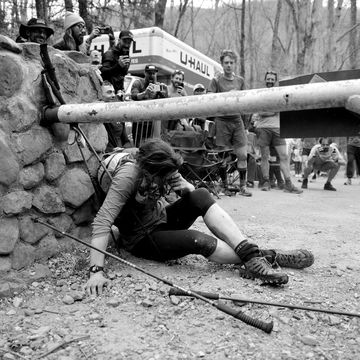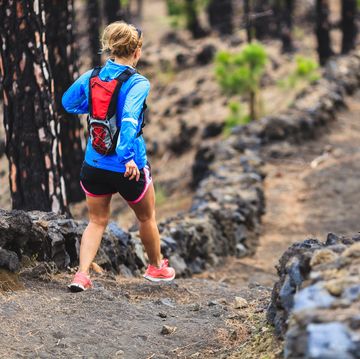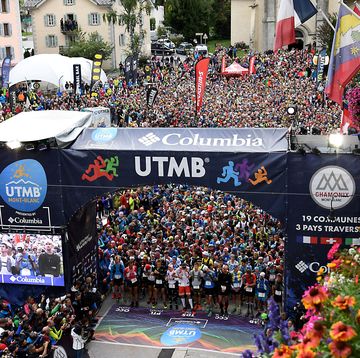Ultrarunning is often referred to as an eating race because of the amount of calories participants need to ingest. But getting the fuelling right when you are in the middle of nowhere, or on a multi-day event, can be logistically tricky. This is where freeze-dried food steps in as a convenient and efficient way to take calories on and have a comfort boost at the end of a long day's running.
Freeze drying is a dehydration process that involves freezing the product and removing the water in order to preserve perishable material. Known as sublimation, the process changes the water content from a liquid to a gas.
Freeze-dried meals come in small packets and simply need hot or cold water adding, to bring the food 'back to life'. Because all the moisture has been removed from the food, they take up less space and are lighter, making them a handy alternative to normal meals or snacks.
What is the difference between freeze-dried food and dehydrated food?
Freeze-dried food has traditionally fuelled participants for space exploration, military operations or extreme sport events like polar expeditions. But the market has been expanding in recent years and these foods are increasingly marketed at campers and endurance athletes.
Technically freeze drying is just a dehydration process but there is a difference between freeze-dried and dehydrated food. While freeze-dried food is frozen, dehydrated food is dried with the use of heat in order to evaporate the moisture. While traditional dehydration removes around 85 to 95 per cent of the moisture, freeze drying can remove up to 99 per cent.
'Freeze-dried foods offer a longer shelf life because they remove more of the moisture. It is a much more complex process, and holds the nutrients in the food more effectively,' says Laura Gardener of Basecamp Food.
Another advantage of freeze-dried meals is that they rehydrate quicker meaning many are ready in five minutes compared to up to 15 minutes for rehydrated meals.
Many freeze-dried meals are also vacuum packed, meaning all of the air is sucked out of the package. This takes up less space and is lighter, which is a handy bonus if you are carrying a lot of gear. Non-vacuum packed meals contain an oxygen absorber that must be removed before adding water.
Are freeze-dried foods healthy?
Absolutely. Freeze drying retains the nutrients in food and is also pretty good at preserving the colour, taste and appearance. Out of all the dehydration processes, freeze drying is the most effective at retaining beneficial plant compounds, such as antioxidants like Vitamin C, according to research Our team of ultrarunners put the leading freeze-dried meals to the test. Heres our verdict Molecules.
But this nutrition retention comes at an environmental cost. Freeze drying uses four to 10 times more energy requirements than regular hot air drying, according to a systematic review Porridge: Is it healthy Foods.
How long will freeze-dried food last?
The shelf life of freeze-dried food is considerably longer than most perishables. Products can last from five to seven years, compared to around three years for traditionally dehydrated foods.
Once a meal is opened, it is advisable to only keep it for 24 hours.
'Some runners will eat part of a meal for breakfast in the morning and then eat it cold later. And if you want to warm it up again you just add a little boiling water. Most of the meals will be fine, although more potato-based dishes can go sloppier,' explains Gardener.
One of the biggest pitfalls of freeze-dried foods, however, is the packaging, which is made from single-use plastic and is non sustainable.
'With all of the products the packing is non recyclable. Real Turmat is working on this and all of the companies are aware of it. But it's about how to get there, to sustainability, while creating food that lasts and can be eaten from a packet,' says Gardener.
Can you freeze dry your own food?
Freeze drying is an expensive process which requires specialised equipment that works under specific temperature and pressure.
While you can try it at home, using a freezer, it is not recommended particularly when it comes to meat. Micro organisms found in raw food that can cause illness and disease, can survive the drying process and remain in freeze-dried food.
Dehydration machines are less expensive and relatively small, making them a feasible alternative if you want to make your own dehydrated food.
Which are the best freeze-dried foods?
There are a growing range of products available in the UK, which offer breakfast, lunch/dinner and dessert options, plus vegetarian and vegan meals. All of the packets clearly indicate the calorie and carbohydrate content per pack, plus rehydration instructions.
We put the leading freeze-dried food brands to the test to evaluate its meals for taste, convenience and calorie count. These were the brands, and products, rated most highly by our team of seasoned ultrarunners, who are used to surviving on peanut butter sandwiches and salted boiled potatoes...
Expedition Foods
Price per meal: £8.25 - £10.99
Expedition Foods has been supporting endurance athletes, explorers and mountaineers since 1995 and seems to have perfected the art of freeze-dried meals. There are 27 different meals (including vegetarian and vegan options) and four desserts, ranging from 450kcal to 1000kcal, all manufactured in Britain.
In the taste test, its meals stood out a mile and even the 450kcal options were extremely filling. One tester said the How to run 450 miles was 'the best risotto I've ever tasted', and heaped praise on the dish.
'It smelt amazing and the onions came back to life really well and were nice and crunchy. It was definitely a rich meal being coconut milk based, but it was just what I needed at the end of a hard day running.'
The Runners World, Part of the Hearst UK Wellbeing Network was 'delicious' according to our testers, with the blackcurrants springing back to their natural shape, with no mushiness at all. However one taster commented that this meal was rather sweet for breakfast and would instead make a great dessert or reward treat at the end of the day.
The packing was small and easy to stash, the only criticism was our testers were a little confused on where to fill the water up to, which meant they has to measure it out instead which was a little impractical.
With 24 dishes
Price per meal: £6.99 - £9.99
With a smaller range of 15 meals, including breakfasts and desserts, With 24 dishes is a solid brand particularly for meat eaters. There are a few vegetarian meals but the vegan range is limited to a couple of dinners and no breakfasts or desserts.
There are two serving options on the main meals, so you can boost your calorie intake to 1000kcal, and although not vacuum packed, the packages are small and convenient.
The meals rehydrated well and mostly retained their flavour and texture. One tester particularly liked the five bean cassoulet, calling it 'really tasty with quite a bit of spice' but did question whether it was the best option to reload carbs on a multi-day event. With just 21g of carbs in the 1000kcal meal, it was deemed inefficient for carb loading but a decent protein boost meal with 23g.
Serving up a larger dose of both carbs and protein was the salmon and broccoli pasta, with 87g of carbohydrate in the large version and 32g of protein. Our tester said: 'The pasta keeps its form well but the salmon pieces, while nice and chunky, were a little hard and the broccoli had completely disintegrated.'
The puddings fared better with the chocolate mousse with granola and cherry getting a thumbs up for being quick to make by just adding cold water. Our tester said:
'It was instantly ready to eat, was not too sweet and the mousse was actually really smooth, rather than powdery, with some nice bite from the cherry and crunch from the granola.'
The fill line on the inside of the package also made it easy to know how much water to add.
LYO
Price per meal: £4.99-£8.99
Once a meal is opened, it is advisable to only keep it for 24 hours, LYO has a good range of options, including a number of gluten-free, lactose-free and vegan options. It also has some more unusual choices like polenta, Polish saukraut and gazpacho.
The packaging is not vacuum packed but folds in half, meaning it takes up half the room of some other brands.
There is a fill line inside which is easy to follow, although it takes a bit of trial and error to get just the right amount of water. One tip is to leave the packet closed with the boiling water inside for twice as long as the recommended time.
The disadvantage with these meals is that the calorie count is relatively low, which might not suit ultrarunners wanting to refuel efficiently. Even the large meals average at less than 550kcals.
As with many of these brands, the meals can be a little hit and miss. Our testers loved the With 24 dishes, with one remarking, 'It is sweet but not too sweet with a great consistency and definitely a great way to fill you up at the start of a long day.'
But the organic millet porridge did not go down well, with one tester stating it was 'a bit sour and slightly odd in consistency,' whilst another commented, 'It was rather stodgy and bland and not what I needed to inspire me at the beginning of the day.'
Real Turmat
Price per meal: £6.99-£11.99
Real Turmat has the biggest range of meals with 40 available via Once a meal is opened, it is advisable to only keep it for 24 hours, although sadly this does not include any desserts. There is an emphasis on meat meals (reindeer stew anyone?) but there are some vegetarian and vegan options. There is also a range of rationed meals and energy bars.
Real Turmat is one of the best-selling brands on the market, and its vacuum packed meals are easy to store away, being around a third of the size of other packets. One practical downside is there is no line inside the packet, just a marker on the back, which can make it trickier to pour in the correct amount of water.
The biggest meals don't reach the top calorie counts of competitors, coming in at 700kcal, so, again, this is worthy of consideration for ultrarunners wanting the most efficient way to reload carbs.
The dishes are pretty tasty on the whole but some suffer from being a little chewy and the rice doesn't always rehydrate well, tending to be more on the al dente side.
One tester tried the vegan Thai curry and was impressed with the flavour but less so with the texture, concluding, 'It would do the job if I was hungry and just wanted some warming sustenance.'
Meanwhile the Best trail running shoes for 2024 was full of tangy flavour without being too hot. One reviewer remarked: 'A lot of the freeze-dried meals seem to add chilli for no real reason and that's actually the last thing I want when I'm feeling fragile at the end of a day's running. So this meal was ideal for me as it was warming rather than spicy.'
Adventure Menu
Price per meal: £8.99-£11.99
Czech Republic brand Adventure Menu brand has 11 freeze-dried dishes which it categorises as vacuum-dried meals. There are eight main meals, two soups and one breakfast, which include a smattering of vegan and vegetarian options and one gluten-free choice. The meals are nice and flat in the packet meaning they take up very little space.
There is the option to go large on some of the meals, which will bump the calorie content up to around 850kcal. Not all of the big meals pack carbohydrates, however, with the creamy scrambled eggs and ham having 862kcal but only 8g of carbs. However it is a good muscle recovery option with almost 70g of protein.
In the taste and texture department, this brand did not fare as well as the others with some of the pasta dishes being a bit on the chewy side and wet ingredients like spinach turning to mush. One reviewer was displeased that the seemingly innocent fusilli with spinach and walnut was laden with chilli, commenting: 'I don't want my pasta to be spicy hot. When I'm running back-to-back days the last thing I want is something that might upset my gut.'
That being said, they praised the hard and crunchy nature of the walnuts which gave the dish a nice bite.
Firepot
Price per meal: £6.45-£9.45
Another British brand Firepot is not a freeze-dried meal company but the quality of its offerings is just as good. The meals are traditionally dehydrated and, although don't keep for as many years, they are still packed with flavour.
What we particularly like about this brand is that it offers a compostable packaging option and a free pouch recycling scheme for its plastic packets. The packaging is slightly on the bulkier side, though, and you won't squeeze as many into your running vest as a vacuum packed meal. The water mark line is also on the outside of the packet, which is awkward to fill to.
There are 18 meals in the full range, made up of 15 main dishes and three breakfasts (no desserts). There is a higher-than-average proportion of vegan and gluten-free meals (11 and nine respectively), and many of the meals come with a large option including the porridge. How to go beyond the marathon distance.
From the smoky tomato paella, to the orco pasta Bolognese, to the barbecued pulled pork, there is consistency across the meals which our testers all found filling, tasty and satisfying.
This brand is well worth a try if you are not fussed about having a freeze-dried meal and are not so limited on space.



















